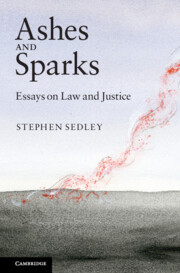Book contents
- Frontmatter
- Contents
- Preface
- Acknowledgements
- PART I History
- 1 Victors' justice
- 2 Above it all
- 3 Reading their rights
- 4 From victim to suspect
- 5 Farewell sovereignty
- 6 No law at all
- 7 The sound of silence
- 8 The spark in the ashes
- 9 Wringing out the fault
- 10 Everything and nothing
- 11 Skulls and crossbones
- PART II Law
- PART III Justice
- Index
5 - Farewell sovereignty
Published online by Cambridge University Press: 05 June 2012
- Frontmatter
- Contents
- Preface
- Acknowledgements
- PART I History
- 1 Victors' justice
- 2 Above it all
- 3 Reading their rights
- 4 From victim to suspect
- 5 Farewell sovereignty
- 6 No law at all
- 7 The sound of silence
- 8 The spark in the ashes
- 9 Wringing out the fault
- 10 Everything and nothing
- 11 Skulls and crossbones
- PART II Law
- PART III Justice
- Index
Summary
The opening sentence of this article (a review published in the London Review of Books in 2006 of The Tyrannicide Brief, a study by Geoffrey Robertson QC of a neglected – in fact a sedulously ignored – figure of the Interregnum, the Solicitor General John Cooke) goes some way to explaining my interest in this still contentious period of English history. Just how sensitive it continues to be is perhaps illustrated by the reception, described in the article, of Robertson's talk at Gray's Inn on the 350th anniversary of the execution of Charles I, whose arrogant and unwise conduct up to and through the Civil War stands in contrast to the dignity with which he faced his trial and execution – an execution which, as Robertson pointed out, itself stands in contrast to the barbaric treatment of the regicides at the Restoration.
Some years ago, visiting the library at Windsor Castle while on circuit at Reading, I was handed the silk-bound bible which Charles I had taken with him to the scaffold. I do not find it easy to be unmoved by such things, any more than by the bullet-holes in the churchyard wall at Burford where the leaders of the Leveller mutiny were shot a few weeks later, or by the cruelty of Cooke's own end.
When I read for the English Bar in the 1960s, the legal history lecturer stopped when he reached 1649 and explained that he was now moving directly to 1660 because everything that had happened between the trial of the king and the restoration of the monarchy was a legal nullity.
- Type
- Chapter
- Information
- Ashes and SparksEssays On Law and Justice, pp. 49 - 55Publisher: Cambridge University PressPrint publication year: 2011



